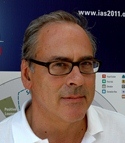Welcome to the new edition of UNAIDS Science now and welcome back to the loyal readers of HIV this week.
We have made a few changes and welcome your feedback.
HIV this month will now be updated on a monthly basis.
As previously, we have selected and posted the highlighted abstracts from about 20 of the most interesting papers from the scientific literature to have appeared in the previous month.
In addition, we have asked a Guest Editor to provide his perspective on why these findings are important and where they fit into the broader context of HIV research.
This month's Guest Editor is Professor Stefano Vella.
 Stefano is a medical doctor and Head of the Department of Therapeutic Research and Medicines Evaluation of the Istituto Superiore di Sanità (ISS), the Italian National Institute of Health in Rome. Since the early days of the HIV epidemic he has worked in research, advocacy and clinical medicine and has served in a leadership or advisory role in many of the major international agencies including IAS (past President); ANRS (Vice President of the Scientific Council); UNAIDS (Programme Coordinating Board); WHO (Chair of Treatment Guidelines Committee); NIH (Panels on anti-retroviral therapy principles); Global Fund to fight AIDS, TB and Malaria (Technical Review Panel and Italian constituency); EDCTP (General Assembly).
Stefano is a medical doctor and Head of the Department of Therapeutic Research and Medicines Evaluation of the Istituto Superiore di Sanità (ISS), the Italian National Institute of Health in Rome. Since the early days of the HIV epidemic he has worked in research, advocacy and clinical medicine and has served in a leadership or advisory role in many of the major international agencies including IAS (past President); ANRS (Vice President of the Scientific Council); UNAIDS (Programme Coordinating Board); WHO (Chair of Treatment Guidelines Committee); NIH (Panels on anti-retroviral therapy principles); Global Fund to fight AIDS, TB and Malaria (Technical Review Panel and Italian constituency); EDCTP (General Assembly).
His research interests are mainly directed towards: the study of HIV resistance to antiretroviral drugs; the mechanisms of immune reconstitution; the perfecting of antiretroviral therapy.
We hope you enjoy his insights.
Peter Godfrey-Faussett and Celeste Sandoval
UNAIDS
Coming up in our next issue: A thank you to HIV this week founding editor Dr Catherine Hankins, formerly Chief Scientific Adviser to UNAIDS, now at the Amsterdam Institute for Global Health and Development.
HIV this month - January 2013
Welcome to the 1st issue of the UNAIDS Science now digest HIV this month! In this issue, we cover the following topics:
1. Reducing sexual transmission
- Benefits (and risks) of PrEP roll-over
- Lost in translation: antiretroviral treatment for discordant couples in the real world
- Biomedical prevention: not just antiretrovirals
2. Eliminating new HIV infection among children
3. 15 million accessing treatment
- "Start then switch": an interesting option in phasing out d4T
- HIV and co-morbidities: today’s "western" problems may arrive soon in countries with generalized epidemics
- HIV / HCV co-infection: an emerging threat for eastern Europe and central Asia
- 15 million on antiretrovirals by 2015: drug resistance
- HIV care in resource limited settings: not just a matter of drugs
- Addressing barriers to universal access: focus on the pre-ART phase
4. Eliminating gender inequalities
5. Strengthening HIV integration
To find out how you can access a majority of scientific journals free of charge, check the UNAIDS Science now website by clicking here. If you would like to subscribe to HIV this month issues, click here. To unsubscribe, please click here. Please let us know what your interests are and what you think of HIV this month by sending us an email here. If you would like to recommend an article for inclusion, please contact us. Remember, a wealth of information on the HIV epidemic and responses to it are accessible at www.unaids.org.